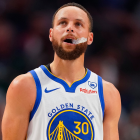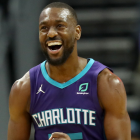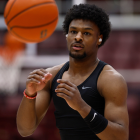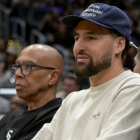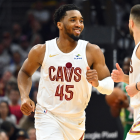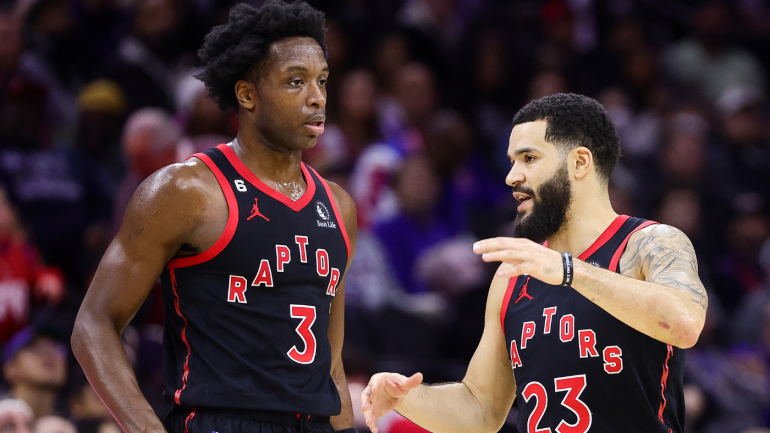
The NBA trade deadline is now less than two weeks away, yet thus far, the moves have been minimal. In fact, we've only seen two total trades to this point: Boston dumping Noah Vonleh on San Antonio and Washington sending Rui Hachimura to the Los Angeles Lakers.
Eventually, this is going to change. There is simply too much incentive for teams to trade at this deadline for it not to. Only two teams in the NBA are currently on pace to win 55 games. There is virtually no separation between the teams fighting for the No. 2 seed in the Eastern Conference, and things are even tighter in a Western Conference in which teams might find themselves in sixth place one night and 12th the next.
More than half of the league can talk itself into a deep playoff run this season, and as such, there is going to be plenty of action at the deadline as buyers try to secure their place atop their conferences. But who are the players who can help them do that? Here are the 20 best players that could be moved at the trade deadline. One notable caveat: we're leaving out the All-Stars... for now. DeMar DeRozan, Zach LaVine and Bradley Beal are all sensible trade candidates given where their team stands, but until there's credible reporting on their availability, we'll stick with (slightly) smaller names.
20. Russell Westbrook
Well... we'll start with one pretty big name. Westbrook is an interesting case. Nobody is trading for him with the intent of playing him. For all of the good press he's earned for accepting a bench role, Westbrook is not only shooting worse than last season but turning the ball over more as well. All of the fatal flaws we've seen torpedo his postseason hopes in the past still exist. But he's also a $47 million expiring contract, and if the Lakers plan to make a move that involves significant salary, Westbrook almost has to be in it. That's where things get interesting. At $47 million, Westbrook is an albatross. Divide that salary by 10 and he suddenly looks pretty interesting. For all of his flaws, teams like the Clippers and Suns could really take advantage of the pressure he puts on the rim in small doses. If he's dealt, expect him to generate a robust buyout market in a smaller role for a contender.
19. Caris LeVert
How much do teams believe in LeVert's 3-point shooting? That's the seminal question here. A three-level scorer hitting 38 percent of his 3-pointers on reasonable volume would be a great addition to any bench. If he's closer to the 33 percent he made in his career prior to this season? Well, then you're suddenly looking at a mid-range heavy reserve that doesn't play much defense and needs a new contract. There's nothing wrong with that, but it's the sort of player that gets traded merely as matching salary to a team looking for a third guard rather than the sort of asset-generator the Cavs would like him to be. Cleveland would love to turn LeVert's salary slot into a small forward that can either shoot or defend at a higher level than their 6-6 guard. Without any first-round picks to dangle, he's their only path to that sort of player at the deadline.
18. Eric Gordon
Gordon's 3-point shooting is deceptive in the other direction. He's down to around 34 percent from deep this season, but remember, he'll fire away from far behind the line and typically has to create his own shots because, well, Houston's offense doesn't exactly do a great job of setting up shooters. His ability to defend bigger players is valuable as well in the switch-heavy postseason, but Gordon is 34, and a quirk in his contract might turn off some cost-conscious buyers. Gordon will become a free agent after this season... unless his team wins the championship, which would guarantee him around $20.9 million.
17. Jae Crowder
Can Crowder jump onto a contender and contribute without having played this season? Theoretically, sure. He was a teammate of Andre Iguodala's in 2020, when the 2015 Finals MVP did just that with the Miami Heat. Crowder's playing style, unlike his personality, is relatively low maintenance. It's not that hard to join a team in February, defend opposing forwards and shoot a league-average percentage from deep. That might sound like it's trivializing his contributions, but it isn't. Crowder does things that every team needs, and as such, virtually every contender is going to sniff around him between now and the deadline.
16. Seth Curry
Curry and Joe Harris are really sharing this slot because the presence of one makes the other expendable. Both are having down years coming off of injuries. Both are among the best shooters in basketball when healthy. Both are sizable matching salaries for a Nets team that seems to want to be aggressive at the deadline. Curry is the better shot-creator of the two. Harris, in part because of his size, is the better defender. Curry's expiring contract makes him the likelier of the two to be moved, but it will ultimately come down to who Brooklyn wants to acquire and how much salary they need to send out in return.
15. P.J. Washington
Washington isn't an elite defender at any single position, but his positional versatility is critical for the small-ball postseason. Though primarily a power forward for his career, he's slid down to small forward in certain matchups, and last season, he actually spent the bulk of his minutes at center. The playoffs prize lineup flexibility. Plenty of teams in need of forward help will be interested in Washington, but the team that gets him will likely be the one that wants to use him at center a bit as well.
14. Mike Conley
A trade for Conley is a trade for an adult in the room. He's not going to score much for you at this stage of his career, and he, like the rest of Utah's perimeter players, was absolutely torched defensively by the Mavericks last postseason, but if you can live with those defects, you're getting the best floor general on the market. Need someone to settle down your offense and lead bench stretches? Conley is your man.
13. Jordan Clarkson
Speaking of Utah guards who couldn't defend the Mavericks last spring, Clarkson's shot creation has never been better than it is this season. He's averaging career-highs in points and assists for a Jazz team that has needed him to take on more of a leadership burden. He's done so quite well, but in addition to his defensive defects, his playoff history is not strong. Regular-season Clarkson is a 20-point scorer. Playoff Clarkson, thus far, is at 11.7 points per game on 41.3 percent from the field and 32.9 percent from deep.
12. Terry Rozier
An excellent shooter, a passable defender despite his small stature and still a fairly explosive attacker off the dribble, the concerns Rozier presents are contractual. Rozier is owed more than $70 million over the next three seasons, and if the Hornets intended to pay that to him, he wouldn't be such a popular trade candidate. That is not a deal you absorb flippantly for a third guard. If you land Rozier now, it's because you expect him to be your point guard for the next several seasons. There aren't many contenders willing or able to make that sort of commitment, but if the asset cost is low enough, someone will.
11. D'Angelo Russell
Russell has a higher upside than Rozier, but he'll probably command a bigger deal in free agency this offseason. That's worthwhile in the right setting. Russell is by far the superior playmaker, and while his shooting waxes and wanes, he's a better individual shot-creator as well. He's a trick defensive fit on most teams though. Minnesota found success last season playing him off of the ball in their aggressive scheme, allowing him to take advantage of his basketball IQ to call out coverages and help at the basket. That's a tricky piece to fit on most defenses, especially in the playoffs, when opponents hunt poor individual defenders into extinction. Russell has kept Minnesota afloat lately, though, and Anthony Edwards is thriving enough in his presence to dispel fit concerns. If the Timberwolves trade him, it will be because they've found a long-term point guard option they prefer.
10. Jakob Poeltl
Poeltl is the rare high-end big man that doesn't shoot or catch lobs. That makes him a more complicated offensive fit, but a rewarding one in the right setting. Poeltl is a gifted passer and clever screener, someone who can help take advantage of the shooters and shot-creators you have even if he's not going to take much more than a few push shots per game himself. His defense is the real attraction here, though. He can survive on the perimeter, but he's among the NBA's best rim protectors even without blocking a copious amount of shots. Put the right point-of-attack defenders in front of him and he can absolutely anchor a postseason defense.
9. John Collins
Collins isn't anchoring anything, but his offensive game is far more diverse than Poeltl's. He can shoot. He can dunk lobs. He can post up. He can even dribble a bit. Stick him with a high-usage pick-and-roll creator and he offers a very nice dose of unpredictability to your offense. In a more egalitarian system, he'll sneak his way to 20 points in transition and off putbacks and with the shots he creates for himself. You need to be able to protect him defensively as Atlanta did with Clint Capela during their Eastern Conference finals run, but doing so opens up a whole lot for the right offense.
8. Nikola Vucevic
The Bulls are likely dragging their feet on LaVine and DeRozan until the offseason at least, but that's not a luxury they can afford with Vucevic. The two-time All-Star will be a free agent this offseason, and the frugal Bulls may not be willing to break the bank for a 32-year-old that can't defend in the postseason. Still, Vucevic has managed to build up a good chunk of his trade value after a down year a season ago. He's shooting a career-high 59.4 percent on 2-pointers this season, but perhaps more importantly, is back up to 37.6 percent on his 3-pointers. Not many teams can work him into their defense seamlessly, but if nothing else, he's a killer bench big in the right matchups that can start without intruding on an incumbent star's territory offensively.
7. Gary Trent Jr.
The offense is a given. Trent is going to shoot somewhere between average and above average from deep on high volume with the ability to create his own shot and pick up points within the flow of just about any offense. Last season, he paired that scoring with the best defense of his career. Nick Nurse criticized him for his defense earlier this season, but just about every Raptor not named OG Anunoby is having a down year on that end of the floor. Trent has a player option. He has every reason to commit himself defensively on a contender, but his inconsistency remains a real concern.
6. Alex Caruso
There's no fit question here. Alex Caruso defends everybody. He even held his own against Giannis Antetokounmpo last postseason. FiveThirtyEight's RAPTOR ranks him as the best defender in the NBA at any position, and it's not hard to see why. Guards can't get around him, and he's practically immune to screens. His length and low center of gravity allow him to defend any position. His reflexes are lightning-quick. His basketball IQ is stellar, and that translates to his offense as well, where he feasts as a cutter and connective passer. If you can tolerate his low 3-point volume (though he's hitting 39 percent of his attempts this season!) Caruso will give you the sort of role player that can work in any lineup construction on any kind of roster.

CBS Sports HQ Newsletter
Your Ultimate Guide to Every Day in Sports
We bring sports news that matters to your inbox, to help you stay informed and get a winning edge.
Thanks for signing up!
Keep an eye on your inbox.
Sorry!
There was an error processing your subscription.
5. Kyle Kuzma
Here's the $100 million question: is Kuzma going to be both satisfied and effective as more of a catch-and-shoot role player if he's traded to another contender? He's made it clear he's enjoyed being able to expand his game in Washington. He's still not enough of a shot-creator to justify significant possession investment. Those things are useful for bench lineups and attacking closeouts, but ultimately, how appealing is a 34 percent 3-point shooter that probably shouldn't do all that much more offensively to a contender? That shooting is the only question. He's grown enough as a rebounder, defender and general space navigator over the past three seasons to fit in as a glorified role player even if that isn't his preferred situation. Now that the Wizards have traded Hachimura, though, Kuzma may not be as available as he once appeared.
4. Bojan Bogdanovic
Bogdanovic is flirting with the best offensive numbers of his career, and he's doing it on a team with absolutely no shot creation. He's on pace to set new career highs in true shooting percentage and effective field goal percentage while coming quite close to breaking his previous highs in both 2-point shooting and 3-point shooting. Bogdanovic is aging like a fine wine, and that's only going to continue on a team that can do a better job of creating open looks for him. Such a roster would take better advantage of his individual creation as well, and he's no slouch defensively either. There are no major questions when it comes to Bogdanovic in the postseason. He's going to help whichever team he lands with.
3. Myles Turner
Hey, speaking of career highs, Turner is on pace to set new ones in points, rebounds and 3-point percentage. It turns out, breaking up his timeshare with Domantas Sabonis worked wonders for both parties. Now Turner is arguably the NBA's best 3-and-D center, and any team with a shooting deficit elsewhere on the roster could use Turner to make up for it. It becomes a lot easier to survive Ben Simmons' shooting offensively with someone like Turner on the floor, for instance, and a number of rim-heavy teams could take advantage of his unique gifts. As such, Indiana won't let him go cheap. While he's set to be a free agent this offseason, there have reportedly been extension talks already. Any team trading for Turner needs to be ready to give him a long-term deal.
2. Fred VanVleet
To a normal player, dipping from 38 percent on 3-pointers to 34 percent would be a relatively minor development. For VanVleet, it's deadly. Not only does VanVleet take more 3-pointers than 2-pointers, but he's never even shot 45 percent on 2-pointers for a season. VanVleet doesn't get to the basket. He doesn't have a mid-range bag. He shoots 3-pointers and orchestrates your offense. That's his game. When it's going right, as it did a season ago, he's an All-Star. When it goes wrong, as it is this year, things get more complicated. He's seen a similar defensive dip, though that isn't as dire given his age. He can still defend up a position or two, and aside from Caruso, he's the best answer to Stephen Curry and his ilk on this list. There's an inherent risk in investing multiple picks and a long-term contract in a player like VanVleet, who is so dependent on a few traits to generate his value, but the best version of him is absolutely worth it.
1. OG Anunoby
Someone has reportedly offered Toronto three first-round picks for Anunoby. There's a reason they haven't accepted yet. Anunoby is the platonic ideal of the 3-and-D wing, perhaps the single most valuable sub-star in basketball. He's the best defender of big wings in basketball. He's an above-average shooter on reasonable value. The only real question here is how badly Anunoby wants to expand his game in a bigger role. Reports have indicated that his ambitions extend beyond the 3-and-D realm, but like Kuzma, even if he's improved as a ball-handler, he's still not the sort of player that can be trusted to carry a significant shot-creation load. Given his 2025 player option, any team acquiring Anunoby would need to acquiesce to some extent. This is not a player you trade for as a low-maintenance playoff role player. He's more like what Andrew Wiggins was to the Warriors a season ago. His primary job will be defense and he can scale his usage down alongside the starters, but his team is ultimately going to have to devote some possessions to him as a ball-handler. If the right team does that, it would be adding the sort of player all 30 teams desperately covet.










